The smoky flavor that comes from pit barbecuing is one of the secrets to mouthwatering ribs that cooks in the Southern United States have used for decades. Open-pit cooking may take longer than other techniques, but it creates tender, juicy ribs that fall off the bone. With only a few tools, you can easily cook delectable ribs while camping, at the seashore or in your own backyard.
Step 1
Rub the ribs with your favorite store-bought or homemade spice mix along with salt and pepper to taste and store in the refrigerator or in a cooler for an hour or at least 30 minutes.
Step 2
Dig the pit with a shovel, if you don't have a ready-made site. Make the pit about 1 foot larger all the way around than the amount of ribs you plan to cook.
Step 3
Layer the bottom of the pit with bricks, stones or cinder blocks to help the fire retain heat like the walls of an oven and assist in cooking the ribs. Keep one end of the pit narrow enough to fit in a wire rack.
Step 4
Add charcoal or seasoned hardwood to the bottom of the fire pit, light it, and allow it to burn down to hot glowing embers. Self-igniting charcoal provides the best results; you don't have to add lighter fluid that can affect the taste of the ribs. Rake the embers with a shovel to the middle of the pit. Keep a few fresh pieces of wood or coal at the back of the fire pit to replenish your bed of coals as you cook.
Step 5
Soak wood chips -- good choices include hickory or mesquite -- for 30 minutes. Soaking the chips prevents them from catching fire, but it also boosts smoke production to infuse the smoky flavor from the wood. Wrap wood chips in foil with holes poked through for venting, and place the foil pack directly over the coals.
Step 6
Position a grill or grate over the coals, 4 to 6 inches from the heat source. Place a pan underneath to catch drippings and add enough water to the pan that you won't burn up your drippings.
Step 7
Allow the seasoned ribs to come to room temperature and then place them on top of the grill or grate. Cover the pit with a lid, which can be any large piece of wood or metal. The lid helps retain heat and allows the smoke to permeate the ribs.
Step 8
Slow roast the ribs for 30 minutes per each 3 pounds of ribs. Turn the ribs over with tongs every 15 minutes or so for even cooking and browning. Ribs are done when you poke a fork in the center of the meat, and it looks white with no pink juices. For safety, a meat thermometer should register an internal temperature of at least 145 degrees Fahrenheit at the thickest part of the rib, away from the bone.
Step 9
Let the ribs rest for 10 minutes before cutting and serving to help the juices redistribute into the meat.
Related Articles

How to Cook a Brisket in the Ground
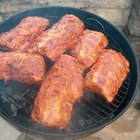
How to Smoke Ribs With a Gas Smoker
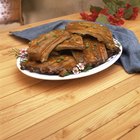
How to Cook Pork Ribs on a Propane Grill

How Do I Start a Mesquite Wood BBQ?

How to Smoke Pollock

How to Cook Pork Underground

How to Cook Trout Fillets in Tin Foil

How to Cook Lechon

How to Cook With a Brinkmann Barrel ...
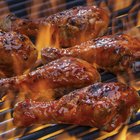
How to Cook Chicken in a Crockpot & ...

How to Cook Japanese Teppanyaki

How to Mix Wet Wood & Charcoal for a ...

How to Smoke Haddock
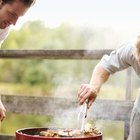
How to Relight BBQ Charcoal

How to Cook Wild Boar Ribs
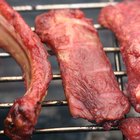
How to Smoke Food With Cedar Chips

How to Cook Barbecue Deer in the Slow ...
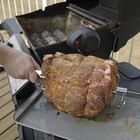
How to Barbeque Boneless Prime Rib on a ...

How to Cook Saba Fish
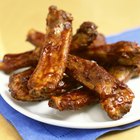
How to Slow Cook Barbecue Ribs in a ...
References
- Legends of Texas Barbecue Cook: Recipes and Recollections from the Pit Bosses; Robb Walsh
- Mother Earth News: Backyard Barbecue Pit
Tips
- It the coals didn't build up enough heat and the meat is underdone, you can finish cooking the ribs in a moderate oven.
Warnings
- When you're ready to remove the ribs, wear protective gloves and be aware that the coals can flare up into a fire when the oxygen reaches them.
- In case of fire, keep a bucket of water or a hose nearby as you're cooking.
Writer Bio
Bonnie Singleton has been writing professionally since 1996. She has written for various newspapers and magazines including "The Washington Times" and "Woman's World." She also wrote for the BBC-TV news magazine "From Washington" and worked for Discovery Channel online for more than a decade. Singleton holds a master's degree in musicology from Florida State University and is a member of the American Independent Writers.